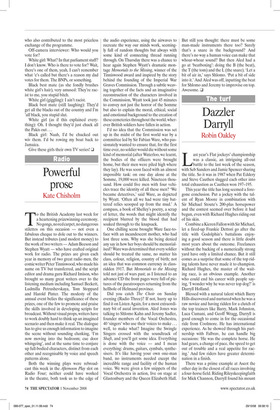Powerful prose
Kate Chisholm
To the British Academy last week for a heartening prizewinning ceremony. No gongs, no red carpet, no dangerous stilettos on this occasion — not even a fabulous cheque to dole out to the winners. But instead tributes (and modest money) to the work of two writers — Adam Beeson and Stephen Wyatt — who have crafted original work for radio. The prizes are given each year in memory of two great radio men, the comic writer Peter Tinniswood, who made his name on TV but transferred, and the script editor and drama guru Richard Imison, who brought so many great writers over to the listening medium including Samuel Beckett, Ludmilla Petrushevskaya, Tom Stoppard and Harold Pinter. The modesty of the annual event belies the significance of these prizes, one of the few to promote and praise the skills involved in developing scripts for broadcast. Without visual props, writers have to work doubly hard to think up an imagined scenario and then make it real. The dialogue has to give us enough information to imagine the scene without sounding clunking, ‘I’m now moving into the bedroom; cue door whingeing’, and at the same time to conjure up full-bodied characters, distinct from each other and recognisable by voice and speech patterns alone.
Both the winning plays were rebroadcast this week in the Afternoon Play slot on Radio Four; neither could have worked in the theatre, both took us to the edge of the audio experience, using the airwaves to recreate the way our minds work, seemingly full of random thoughts but always with some kind of connecting thread running through. On Thursday there was a chance to hear again Stephen Wyatt’s dramatic montage Memorials to the Missing, winner of the Tinniswood award and inspired by the story behind the founding of the Imperial War Graves Commission. Through a subtle weaving together of the facts and an imaginative reconstruction of the characters involved in the Commission, Wyatt took just 45 minutes to convey not just the horror of the Somme but also to explain the moral, ethical, social and emotional background to the creation of these cemeteries throughout the world, wherever British soldiers have fallen in action.
I’d no idea that the Commission was set up in the midst of the first world war by a committee led by Sir Fabian Ware, who passionately wanted to ensure that, for the first time ever, no soldier would die without some kind of memorial (after Waterloo, we learnt, the bodies of the officers were brought home, but their men were piled high where they lay). He was soon faced with an almost impossible task: on one day alone at the Somme, 19,000 were killed. Nineteen thousand. How could five men with four vehicles trace the identity of all these men? ‘We became detectives,’ said Ware, as depicted by Wyatt. ‘Often all we had were tiny battered relics scooped up from the mud.’ A compass, a book of Shelley’s poetry, a scrap of letter, the words that might identify the recipient blurred by the blood that had soaked through to the knapsack.
One chilling scene brought Ware face-toface with an incandescent mother, who had lost three sons. Why was she being denied any say in how her boys should be memorialised? Ware was determined that every soldier should be treated the same, no matter his class, colour, religion, country of birth; not an idea that was common currency in classridden 1917. But Memorials to the Missing told not just of wars past; as I listened to an advance CD the front pages were full of pictures of the paratroopers returning from the hellhole of Helmand province.
Did you catch The Choir on Sunday evening (Radio Three)? If not, hurry up to find it on Listen Again, for a most extraordinary bit of aural invention. Aled Jones was talking to Shlomo Kahn and Jeremy Sadler, founder members of the Vocal Orchestra, 40 ‘singers’ who use their voices to make ... well, to make what? Imagine the Swingle Singers crossed with the soundtrack of Shaft, and you’ll get some idea. Everything is done with the voice — and I mean everything: drums, guitars, cymbals, synthesisers. It’s like having your own one-man band, no instruments needed except the incredible range and facility of the human voice. We were given a few snippets of the Vocal Orchestra in action, live on stage at Glastonbury and the Queen Elizabeth Hall. But still you thought: there must be some man-made instruments there too? Surely that’s a snare in the background? And there’s no way a human voice can make that whoar-whoar sound? But then Aled had a go at ‘beatboxing’: doing the B (the beat), the T (the tom) and the L (the snare). ‘Let a bit of air in,’ says Shlomo. ‘Put a bit of side into it.’ And Aled was off, inputting the beat for Shlomo and Jeremy to improvise on top. Awesome. ❑


































































































 Previous page
Previous page